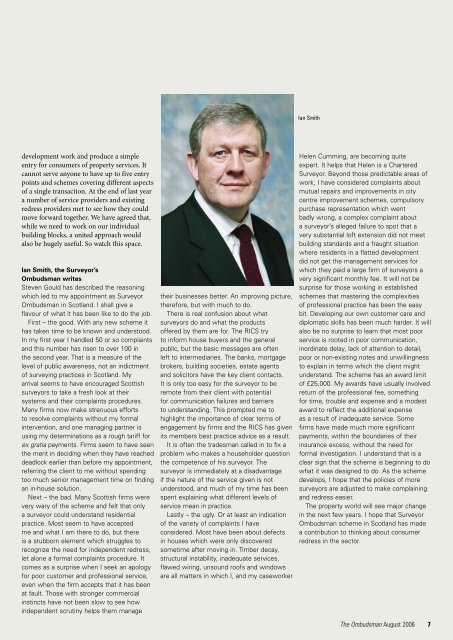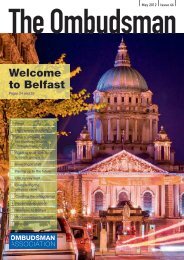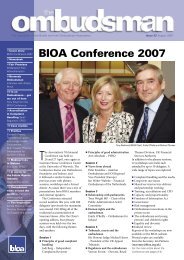29 Ombudsman.indd - British and Irish Ombudsman Association
29 Ombudsman.indd - British and Irish Ombudsman Association
29 Ombudsman.indd - British and Irish Ombudsman Association
You also want an ePaper? Increase the reach of your titles
YUMPU automatically turns print PDFs into web optimized ePapers that Google loves.
Ian Smith<br />
development work <strong>and</strong> produce a simple<br />
entry for consumers of property services. It<br />
cannot serve anyone to have up to five entry<br />
points <strong>and</strong> schemes covering different aspects<br />
of a single transaction. At the end of last year<br />
a number of service providers <strong>and</strong> existing<br />
redress providers met to see how they could<br />
move forward together. We have agreed that,<br />
while we need to work on our individual<br />
building blocks, a united approach would<br />
also be hugely useful. So watch this space.<br />
Ian Smith, the Surveyor’s<br />
<strong>Ombudsman</strong> writes<br />
Steven Gould has described the reasoning<br />
which led to my appointment as Surveyor<br />
<strong>Ombudsman</strong> in Scotl<strong>and</strong>. I shall give a<br />
flavour of what it has been like to do the job.<br />
First – the good. With any new scheme it<br />
has taken time to be known <strong>and</strong> understood.<br />
In my first year I h<strong>and</strong>led 50 or so complaints<br />
<strong>and</strong> this number has risen to over 100 in<br />
the second year. That is a measure of the<br />
level of public awareness, not an indictment<br />
of surveying practices in Scotl<strong>and</strong>. My<br />
arrival seems to have encouraged Scottish<br />
surveyors to take a fresh look at their<br />
systems <strong>and</strong> their complaints procedures.<br />
Many firms now make strenuous efforts<br />
to resolve complaints without my formal<br />
intervention, <strong>and</strong> one managing partner is<br />
using my determinations as a rough tariff for<br />
ex gratia payments. Firms seem to have seen<br />
the merit in deciding when they have reached<br />
deadlock earlier than before my appointment,<br />
referring the client to me without spending<br />
too much senior management time on finding<br />
an in-house solution.<br />
Next – the bad. Many Scottish firms were<br />
very wary of the scheme <strong>and</strong> felt that only<br />
a surveyor could underst<strong>and</strong> residential<br />
practice. Most seem to have accepted<br />
me <strong>and</strong> what I am there to do, but there<br />
is a stubborn element which struggles to<br />
recognize the need for independent redress,<br />
let alone a formal complaints procedure. It<br />
comes as a surprise when I seek an apology<br />
for poor customer <strong>and</strong> professional service,<br />
even when the firm accepts that it has been<br />
at fault. Those with stronger commercial<br />
instincts have not been slow to see how<br />
independent scrutiny helps them manage<br />
their businesses better. An improving picture,<br />
therefore, but with much to do.<br />
There is real confusion about what<br />
surveyors do <strong>and</strong> what the products<br />
offered by them are for. The RICS try<br />
to inform house buyers <strong>and</strong> the general<br />
public, but the basic messages are often<br />
left to intermediaries. The banks, mortgage<br />
brokers, building societies, estate agents<br />
<strong>and</strong> solicitors have the key client contacts.<br />
It is only too easy for the surveyor to be<br />
remote from their client with potential<br />
for communication failures <strong>and</strong> barriers<br />
to underst<strong>and</strong>ing. This prompted me to<br />
highlight the importance of clear terms of<br />
engagement by firms <strong>and</strong> the RICS has given<br />
its members best practice advice as a result.<br />
It is often the tradesman called in to fix a<br />
problem who makes a householder question<br />
the competence of his surveyor. The<br />
surveyor is immediately at a disadvantage<br />
if the nature of the service given is not<br />
understood, <strong>and</strong> much of my time has been<br />
spent explaining what different levels of<br />
service mean in practice.<br />
Lastly – the ugly. Or at least an indication<br />
of the variety of complaints I have<br />
considered. Most have been about defects<br />
in houses which were only discovered<br />
sometime after moving in. Timber decay,<br />
structural instability, inadequate services,<br />
flawed wiring, unsound roofs <strong>and</strong> windows<br />
are all matters in which I, <strong>and</strong> my caseworker<br />
Helen Cumming, are becoming quite<br />
expert. It helps that Helen is a Chartered<br />
Surveyor. Beyond those predictable areas of<br />
work, I have considered complaints about<br />
mutual repairs <strong>and</strong> improvements in city<br />
centre improvement schemes, compulsory<br />
purchase representation which went<br />
badly wrong, a complex complaint about<br />
a surveyor’s alleged failure to spot that a<br />
very substantial loft extension did not meet<br />
building st<strong>and</strong>ards <strong>and</strong> a fraught situation<br />
where residents in a flatted development<br />
did not get the management services for<br />
which they paid a large firm of surveyors a<br />
very significant monthly fee. It will not be<br />
surprise for those working in established<br />
schemes that mastering the complexities<br />
of professional practice has been the easy<br />
bit. Developing our own customer care <strong>and</strong><br />
diplomatic skills has been much harder. It will<br />
also be no surprise to learn that most poor<br />
service is rooted in poor communication,<br />
inordinate delay, lack of attention to detail,<br />
poor or non-existing notes <strong>and</strong> unwillingness<br />
to explain in terms which the client might<br />
underst<strong>and</strong>. The scheme has an award limit<br />
of £25,000. My awards have usually involved<br />
return of the professional fee, something<br />
for time, trouble <strong>and</strong> expense <strong>and</strong> a modest<br />
award to reflect the additional expense<br />
as a result of inadequate service. Some<br />
firms have made much more significant<br />
payments, within the boundaries of their<br />
insurance excess, without the need for<br />
formal investigation. I underst<strong>and</strong> that is a<br />
clear sign that the scheme is beginning to do<br />
what it was designed to do. As the scheme<br />
develops, I hope that the policies of more<br />
surveyors are adjusted to make complaining<br />
<strong>and</strong> redress easier.<br />
The property world will see major change<br />
in the next few years. I hope that Surveyor<br />
<strong>Ombudsman</strong> scheme in Scotl<strong>and</strong> has made<br />
a contribution to thinking about consumer<br />
redress in the sector.<br />
The <strong>Ombudsman</strong> August 2006 7





